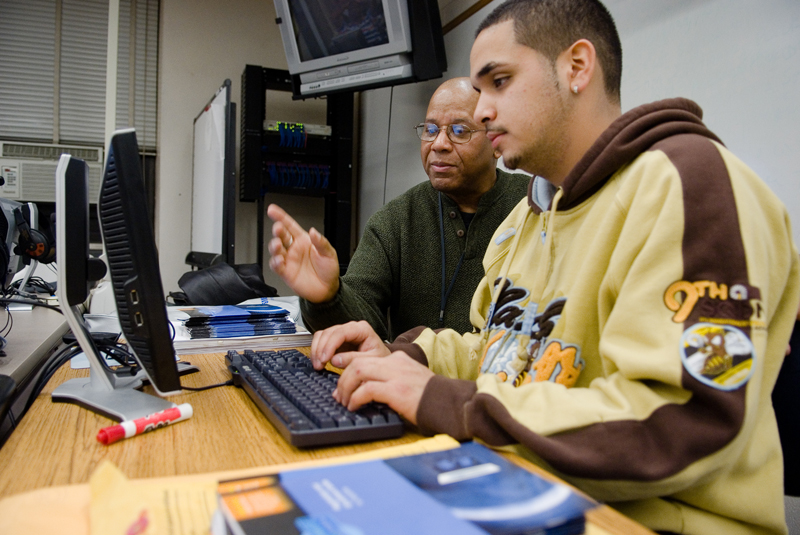Is technology actually making higher education less efficient?

“They would just blather something,” said Arnold, who teaches higher education and educational administration. “They didn’t have a conversation. It was more like a hoop-jumping exercise.”
That was around 2008, and Arnold has avoided assigning online discussions ever since.

Student and instructor at Bronx Community College (Photo by Ryan Brenizer)
Like other faculty with memories of failed experiments such as these, she’s pushing back against the widespread notion that technology can necessarily improve teaching and cut costs.
“We are fooling ourselves that we’re getting more efficient,” she said.
Related: MOOC bandwagon shows signs of slowing down
It’s been a high-stakes bet. Universities and colleges are marketing themselves to tech-savvy teenagers while promising higher productivity and financial savings. They will pour $10.4 billion into education technology this year, according to the Center for Digital Education, from computers to in-class gadgets such as digital projectors and wireless “clickers” that let students answer questions electronically.
But professors say they don’t have enough help to use this technology effectively, haven’t seen results from it, and fear that the cost savings administrators keep insisting that technology will bring could mean their own careers are on the line.
That’s left many in the university ranks rolling their eyes when the next “innovation” pops up.
“We’ve been hearing over the last four or five years that technology is going to reduce costs, increase quality and increase access,” said Diane Harley, director of the Higher Education in the Digital Age project at University of California, Berkeley.
She doesn’t think it can do all three of those things.
“I always say, pick two.”
Not that professors have completely resisted the trend. Nearly 75 percent have tried a new technology in their classes in the past year, according to a survey of 1,600 of them by Faculty Focus, a newsletter that shares effective teaching practices. Yet 34 percent said keeping up with technology was either “moderately” or “very” problematic.
Related: As online courses expand, so do questions about ownership
One of the most common complaints from faculty is that much of this technology creates more work, not less, a survey of 42 professors by David R. Johnson, a sociology researcher at Rice University, found.
One of the reasons for this inefficiency is that professors adopt educational technology from companies that market it to them directly, even when their universities aren’t equipped to troubleshoot or upgrade it, said Gary W. Matkin, dean of continuing education, distance learning, and summer session at the University of California, Irvine. Then, when something even better comes along, faculty and universities chase after that. “It produces this technology war,” said Matkin.
He thinks more universities will eventually switch to the model used by many corporations in which only certain technology is allowed. That way they’ll be better able to manage it — and track the results.
Related: Want higher-ed reform? You may be surprised where you’ll find it
Many schools have used this model to adopt the wireless clickers — or “student response systems” — in large classrooms. Allowing students to use the TV remote-style clickers to collectively answer questions can keep them engaged in lecture classes, according to a study at Canisius College, which found that student grades increased by 4.7 percent in classes that used clickers.
But the technology’s impact goes only so far. In another study released this year, by Butler University professor Juan Pablo Rodriquez Prieto, language students who took clicker-based quizzes performed about 4.5 percent worse than classmates who used pencil and paper.
Clare O’Connor, a Boston College biology professor who teaches several large classes and uses clickers regularly, agrees that they have limitations. She doesn’t use them for quizzes or tests, she said.
“I like students to have the opportunities to change their answers,” she said. “If students have to answer when a question appears on the screen, you eliminate the possibility of more reflective answers.”
One way schools have tried to lower the cost of education is by using another kind of technology: online courses. Yet even after teaching English online for 15 years, Wright State University-Lake Campus’ Martin Kich believes in-person courses offer students far more.
Related: Colleges take cues from private business to improve their customer service
He said he has to assign what he calls “busy work” to online classes simply to check that students are completing assignments, since there’s no opportunity to gather and discuss.
“Academically, they are very suspect,” Kich said of online courses.
Instead of lectures, online courses often use PowerPoint to present material. But studies have found that students, when given the ability to see lectures via PowerPoint — both online and in person — slack on doing their own assigned reading.
“Students perceive the teachers will highlight all of the material worth considering in the textbook,” University of Central Missouri professor Thomas M. Mitchell wrote in a study of the use of PowerPoint in classes. “Unfortunately, students accept this efficient and time-saving system as a normal way of learning and disregard reading as an effective method of acquiring information.”
As for Arnold, she abandoned discussion boards until her university upgraded to Canvas — an online learning management system — and encouraged professors to use it starting this year.
After getting student feedback, she assigned two students to moderate the discussion board each week, filling it with questions that would drive conversation. At the start of class, the two students recap the results, saving Arnold the need to keep daily tabs on the board.
“The good and bad thing about technology is it will do anything,” she said. But “you have to have time at the expense of other things you could be doing to figure it out.”
This story was produced by The Hechinger Report, a nonprofit, independent news website focused on inequality and innovation in education.
This article was originally published on The Heching Report and authored by Ryan Derousseau. Read the original article.





